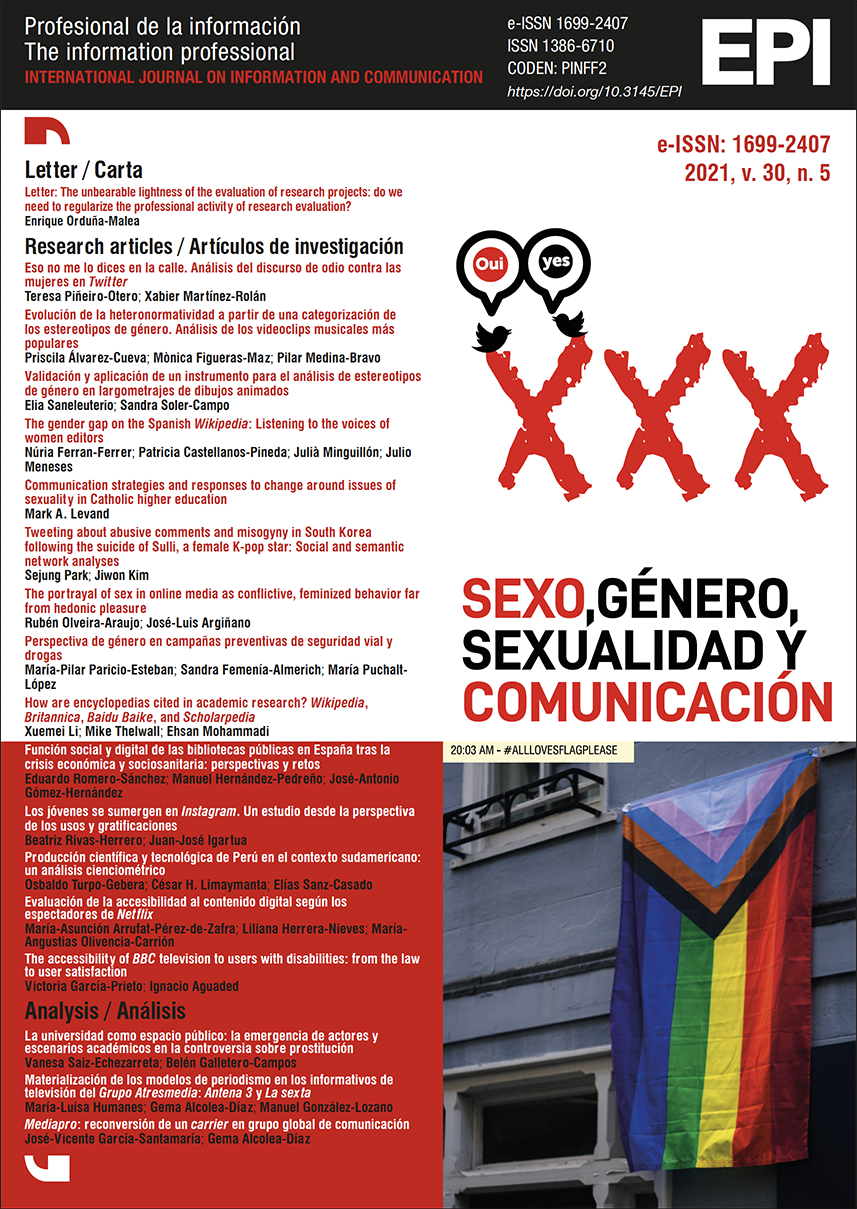The social and digital roles of Spanish public libraries after the economic and the sociosanitary crises: perspectives and challenges
DOI:
https://doi.org/10.3145/epi.2021.sep.10Keywords:
Public libraries, Social inclusion, Digital inclusion, Digital skills, Digital citizenship, Librarians, Profession, Requirements, Needs, Users, Evolution, Economic crises, Pandemics, Covid-19, Coronavirus, Health crises, FutureAbstract
The successive economic and health crises that have marked the past decade have transformed the situation of Spanish public libraries. The objective of this work is to identify the impact, repercussions, and challenges after these crises and to try to describe both the role that public libraries must fulfill from this moment on, as well as the main training, organizational, and service needs that they must address. The applied methodology is mixed, applying several qualitative research techniques such as interviews with experts and discussion groups with library professionals together with a review of documents and good practices. The results reveal how the accumulation of negative effects has generated very diverse impacts, depending on various factors such as the size of the municipality, the degree of institutional support, or the job profiles of library staff. The social function of the library has been valued, as well as the work of inclusion and digital training, which after the pandemic is conceived in a unitary way. Likewise, there is an increase in the gap between libraries because the forms of response to crises depend on their context due to the absence of regional or national policies that support and harmonize the provision of minimum services or basic professional training. It is concluded that there is a need to articulate a new model of public libraries according to the current requirements of society and the general digital transformation.
Downloads
References
Arroyo-Vázquez, Natalia; Hernández-Sánchez, Hilario; Gómez-Hernández, José-Antonio (2019). Las bibliotecas públicas en España: diagnóstico tras la crisis económica. Informe Fesabid. Madrid: Fesabid. ISBN: 978 84 939694 2 4 http://eprints.rclis.org/38948
EAPN (2020). El estado de la pobreza. Seguimiento del indicador de pobreza y exclusión social en España 2008-2019. 10º Informe. Madrid: European Anti-Poverty Network. https://www.eapn.es/estadodepobreza/ARCHIVO/documentos/Informe_AROPE_2020_Xg35pbM.pdf
European Commission (2020). Digital education. Action plan 2021-2027: resetting education and training for the digital age. https://ec.europa.eu/education/sites/default/files/document-library-docs/deap-communication-sept2020_en.pdf
Gallo-León, José-Pablo (coord.) (2020a). Balance y proyección del Informe Prospectiva 2020: Las diez áreas que más van a cambiar en nuestras bibliotecas. Madrid: Ministerio de Cultura y Deporte. https://es.calameo.com/read/000075335a95a56759aa5
Gallo-León, José-Pablo (2020b). "Retrofuturismo en tiempos de Covid-19: cómo las predicciones catastrofistas del pasado nos ayudan en el presente". Anuario ThinkEPI, v. 14, e14b02. https://doi.org/10.3145/thinkepi.2020.e14b02
Gobierno de España (2021). Plan nacional de competencias digitales. https://portal.mineco.gob.es/RecursosNoticia/mineco/prensa/noticias/2021/210127_np_digital.pdf
Gómez-Hernández, José-Antonio; Romero-Sánchez, Eduardo; Hernández-Pedreño, Manuel (2016). "Metodologías de investigación cualitativa de la función social de la biblioteca pública". En: V Seminario hispano brasileño de investigación en información, documentación y sociedad, pp. 431 444. https://digitum.um.es/xmlui/handle/10201/60759
Hernández-Pedreño, Manuel; Romero-Sánchez, Eduardo; Gómez-Hernández, José-Antonio (2019). "Las bibliotecas públicas ante la inclusión digital: desafíos para una ciudadanía más igualitaria". Revista mediterránea de comunicación, v. 10, n. 1, pp. 41-54. https://doi.org/10.14198/MEDCOM2019.10.1.12
IFLA (2021). Coming in 2021: a public library manifesto for today (and tomorrow). https://www.ifla.org/node/93780
Kish, Ilona; Thominet, Hannah; Zignani, Tiana (2021). Libraries on the European agenda. How can the EU leverage the potential of public libraries to tackle European challenges?. Berlin: Urban Agenda for the UE. https://futurium.ec.europa.eu/sites/default/files/2021-05/ACTION%205%20-%20Libraries%20on%20the%20European%20Agenda%20-%20PL%202030_Final_0.pdf
Lázaro-Rodríguez, Pedro (2020). "COBib-Públicas: observatorio de las bibliotecas públicas en España durante la pandemia por Covid-19 basado en noticias digitales". Anuario ThinkEPI, v. 14, e13b04. https://doi.org/10.3145/thinkepi.2020.e14b04
Ministerio de Cultura y Deporte (2021). Bibliotecas públicas españolas en cifras. 2019. https://www.culturaydeporte.gob.es/cultura/areas/bibliotecas/mc/ebp/portada.html
Noh, Younghee; Hong, Hyun-Jin (2021). "A study on the relationship between library service and digital competence". Journal of librarianship and information science, First online. https://doi.org/10.1177/09610006211008962
Romero-Sánchez, Eduardo; Gómez-Hernández, José-Antonio; Hernández-Pedreño, Manuel (2019). "A funí§í£o social das bibliotecas públicas: a perspectiva profissional". Revista ibero-americana de ciíªncia da informaí§í£o, v. 12, n. 2, pp. 341-360. https://doi.org/10.26512/rici.v12.n2.2019.20642
Sellés-Carot, Alicia (coord.) (2019). Estrategia nacional de información y bibliotecas como agentes para la consecución de los objetivos de la Agenda 2030. Consejo de Cooperación Bibliotecaria. https://www.ccbiblio.es/wp-content/uploads/propuesta_estrategia_Bcas-y-Agenda-2030_02.19_rev2.pdf
Vera-Baceta, Miguel-Ángel; Gómez-Hernández, José-Antonio (2021). "Espacios de ciudadanía digital en las bibliotecas públicas: una propuesta para su integración en el marco del Plan nacional de competencias digitales". Anuario ThinkEPI, v. 15, e15b02. https://doi.org/10.3145/thinkepi.2021.e15b02
Wojciechowska, Maja-Dorota (2021). "The role of public libraries in the development of social capital in local communities: a theoretical study". Library management, v. 42, n. 3, pp. 184-196. https://doi.org/10.1108/LM-10-2020-0139
Downloads
Published
How to Cite
Issue
Section
License
Dissemination conditions of the articles once they are published
Authors can freely disseminate their articles on websites, social networks and repositories
However, the following conditions must be respected:
- Only the editorial version should be made public. Please do not publish preprints, postprints or proofs.
- Along with this copy, a specific mention of the publication in which the text has appeared must be included, also adding a clickable link to the URL: http://www.profesionaldelainformacion.com
- Only the final editorial version should be made public. Please do not publish preprints, postprints or proofs.
- Along with that copy, a specific mention of the publication in which the text has appeared must be included, also adding a clickable link to the URL: http://revista.profesionaldelainformacion.com
Profesional de la información journal offers the articles in open access with a Creative Commons BY license.




